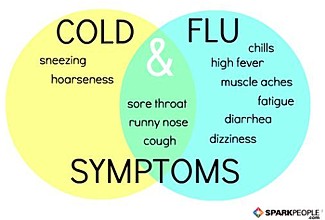CDC Warns of Potentially Severe Flu Season and Urges Vaccinations, Especially For Most At-Risk
 January 9, 2015
January 9, 2015  Kyriaki (Sandy) Venetis
Kyriaki (Sandy) Venetis The Centers for Disease Control and Prevention says early data is suggesting that the current “flu season could be severe” and is recommending immediate vaccination for anyone still unvaccinated, especially for those most vulnerable.

The CDC says those at highest risk include children younger than five years old (especially those younger than two years old); adults ages 65 and older; pregnant women; and people with certain chronic health conditions such as asthma, diabetes, heart and lung disease, and kidney disease.
So far this year, the seasonal influenza A H3N2 viruses have been the most common, and the agency says in past seasons when these viruses have been most common, they have resulted more severe flu symptoms as well as more hospitalizations and deaths.
 flu | tagged
flu | tagged  flu symptoms,
flu symptoms,  flu vaccinations,
flu vaccinations,  flu viruses
flu viruses 



